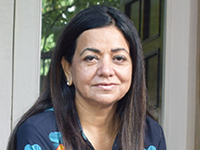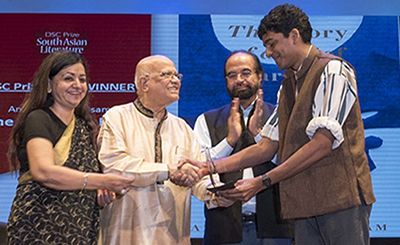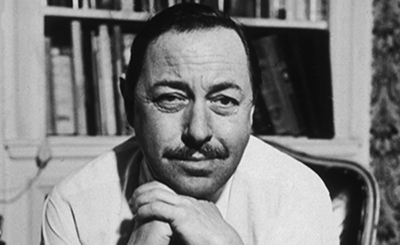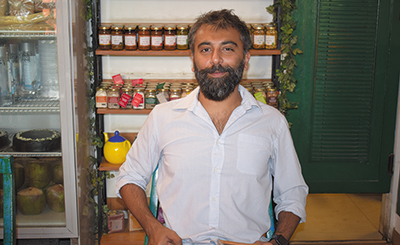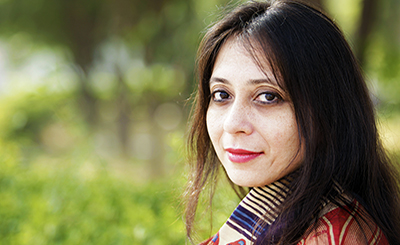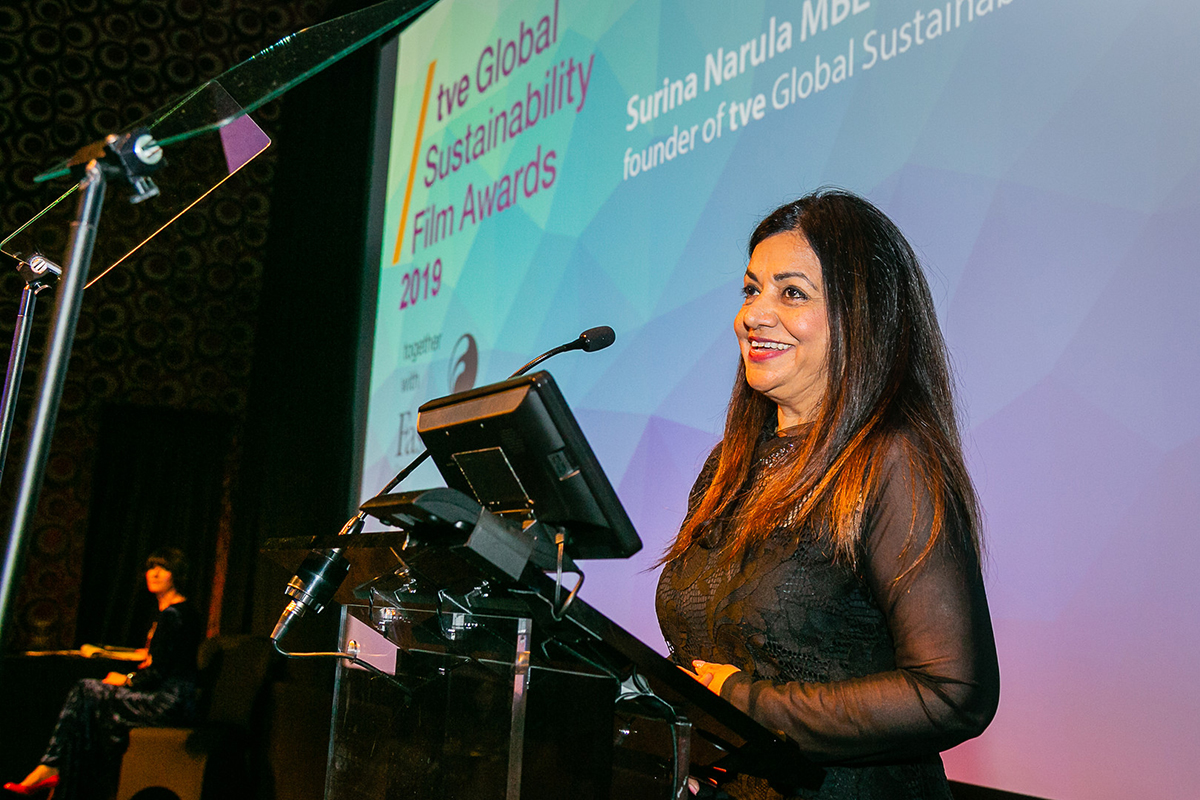
Surina Narula, MBE and Founder of Difficult Dialogues and the tve Global Sustainability Film Awards, delivers the welcome address at a previous edition of the awards week, which are held every year in London at BAFTA, the venue for the major British film awards. Photos: tve GSFA
tve Global Sustainability Film Awards, which are held every year in London at BAFTA, the venue for the major British film awards, completes nine years. Surina Narula, MBE and Founder of Difficult Dialogues and the tve GSFA, writes about the week-long virtual edition of the event which put the spotlight on global sustainability through dialogues, debates and films
We have been living in strange times since the beginning of this year. The pandemic looms large over everything we do. In the beginning, we braced ourselves and stood still, but when we realised that it was not a tsunami but a slow rising of the water around us, we decided to build our boats and continue life. The tve Global Sustainability Film Awards 2020 (tve GSFA) is one such endeavour.
These global film awards, which are held every year in London at BAFTA, the venue for the major British film awards, has now completed nine successful years. These annual awards are given to films that highlight solutions for environmental sustainability. We started off by encouraging companies to send us short films on their corporate social responsibility (CSR) which had become mandatory in India. This enabled us to help corporations understand what exactly this responsibility meant, as they often worked outside of their own remit and engaged with education and slum development. We were looking for businesses that were becoming intrinsically more sustainable by making sustainable products and packaging, and also promoting social sustainability by encouraging more women to join their workforce and engaging with diverse groups. This was their way of implementing the UN specified Sustainability Development Goals (SDG) within their own culture and domain of operation.
Having worked in the NGO sector for thirty years, I realised that corporations often lacked the knowledge of social development, education implementation and climate change issues which were outside of their profit-making structure. The idea was to encourage sustainability and profit-making to go hand in hand. Global Sustainability was only possible if corporations understood that investing in sustainability would lead to long-term profitability, and the fact that their very survival depended on it. This understanding needs to be hard-wired into the DNA and core business strategy of the company; instead of them just setting aside a fund for NGOs as part of a detached CSR plan. We felt that a good way to usher in this change was through communication and the medium of films to see how other organisations globally are going about being more sustainable. The films that we invite for the tve GSFA have to be about sustainable solutions, which is at the core of these awards. The jury panel comprising filmmakers and environmental experts, while adjudicating, reward on-ground impact along with the creative aspect of the film.
Earlier in the year, we had just finished our fifth edition of the Difficult Dialogues forum in Goa which was focused on the State of the Law. The Difficult Dialogues initiative is all about discussing policy formulation and implementation with stake-holders who normally didn’t have a place at the table. It is crucial to involve the last mile policy implementers in the policy discussions — these include forgotten people like Bhanwari Devi from Rajasthan who had no idea what she had signed up for when, as a government social worker, she went about her work of implementing the policy of child marriage. She was ill-equipped to deal with the wrath of the upper caste society which wanted to marry off their infant daughters, and she ended up getting raped. Had the policy makers understood what they were asking her to do given the prevalent environment, and provided her adequate security and training, such an incident could have been stopped from happening. We encourage such grassroots people normally connected with NGOs to come to our forum to have a difficult dialogue with policy makers from the government and other authorities.
As part of Difficult Dialogues, we also encourage the youth to have this difficult dialogue with policy makers by bringing in their voice through the Daring Debates initiative. Over the years, these debates have been held at universities across India, but this year we have gone global with teams participating from India, Nepal, Myanmar, Bangladesh, Africa, USA and Sri Lanka. It was great to increase the involvement of the youth from all parts of the world in policy ideation — imagine a student from Harvard University debating an issue with a student from Pondicherry or Dhaka. This year, as part of the Final Awards Week, we had 14 finalists discussing the very relevant topic — “Is Global Sustainability Profitable for Business?” At the end of a keenly contested finale, Gloria Oziohu Alonge from University of Lagos, Nigeria, Africa, was declared as the winner for the motion while Aditya Dhar from Harvard University, USA, won against the motion.
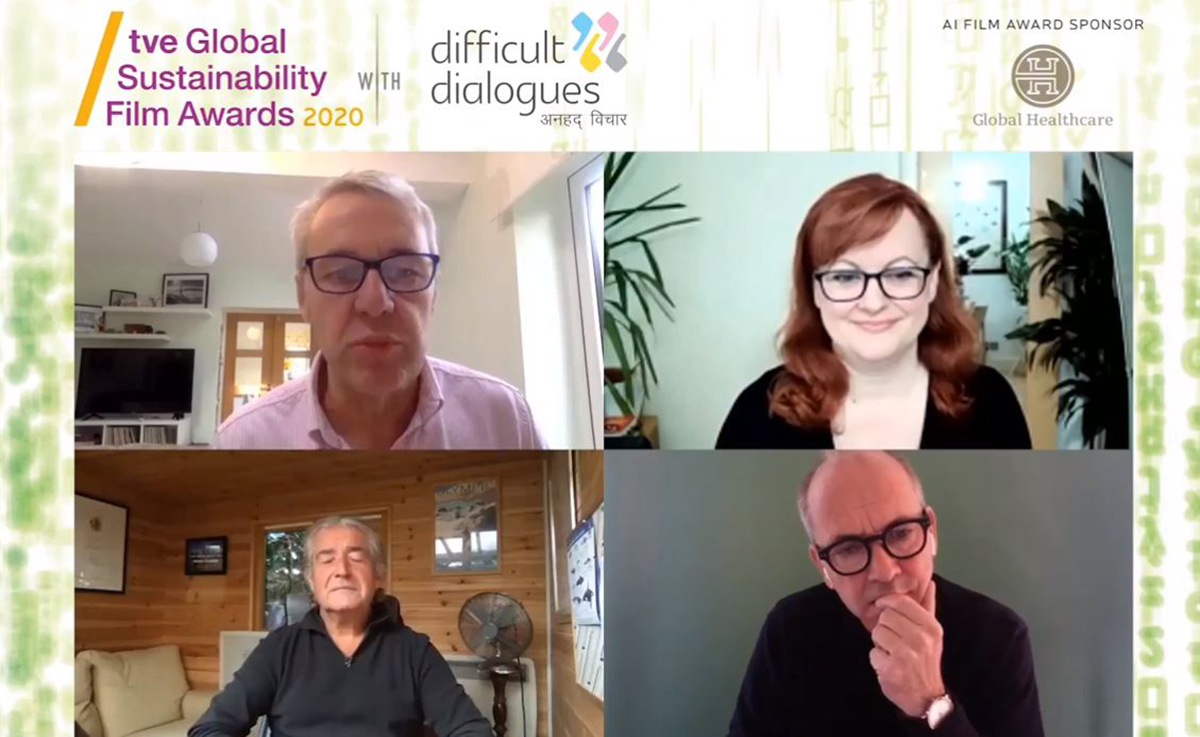
(Clockwise from top) Andrew Wilson, a change agent with expertise in sustainability and business purposes, and former Executive Director of Purpose at Edelman, the global PR and communications firm; Solitaire Townsend, a passionate change-maker, and co-founder of Futerra, who advises governments, charities and brands on imagining a better future and making it happen; Andrew Dunnett, Director of Vodafone Foundation, previously a Ministerial Adviser to the Sustainable Development Unit at the UK Department of Trade and Industry; and Tony Juniper, a campaigner, writer, sustainability adviser and environmentalist, and Chair of Natural England which works for the conservation and restoration of the natural environment in England, during a panel discussion at the tve Global Sustainability Film Awards 2020.
Since the theme for this edition of Difficult Dialogues was on Global Sustainability, it made a lot of sense to partner with the tve GSFA which has been focused on this issue since its inception nine years back. This association allowed us to combine thought-provoking Difficult Dialogues panel discussions with sustainability film awards to provide a holistic and inspiring week-long online event through the mediums of dialogues, debates and films.
For carrying out the various activities and events for the special Awards Week, we decided to join forces so this boat that we were building to survive the pandemic could be reinforced with two teams working on it — one from London and the other based in India. A lot of the tasks were shared which normally would have meant a huge amount of extra expenses, and the best thing was that there was a lot of synergy, bonding and learning for the entire team. Technology was a boon we had not yet begun to appreciate, but whose power we were able to harness to deliver a seamless virtual event over five days. The editing team in New Delhi that normally cuts our videos for Difficult Dialogues worked closely with the UK production team to learn about new technology and broadcasting systems to ensure the smooth running of the event.
Between Difficult Dialogues and the tve GSFA, we had 11 social media handles operating which ensured good participation and eyeballs for the event. This joint social media campaign turned out to be more successful than we imagined in terms of reach and advocacy. Our DSC Prize for South Asian Literature team worked day and night on these film awards and brought in their significant experience and expertise in organising and judging awards. They were instrumental in submitters sending in a record 108 films for the tve GSFA 2020 and thereafter seamlessly managing close to 40 jury members to arrive and the category-wise shortlists and the eventual winners. This event was a great example of partnerships and cooperation, and it was heartening to see the India team connecting so well with the UK team, with both working seamlessly together to deliver this successful event.
Each day, over the Awards Week, we had a couple of thousand people watching these live broadcasts which would otherwise normally be watched by a room full of 200 people. The virtual world provided us with a much greater reach and time which enabled us to also include our jury members’ viewpoints as well as sustainability messages from our youth ambassadors from all over the world. Films have been a strong medium to fire up people’s imagination about crucial and pressing issues like global sustainability, and I hope the audience will take back some learning that they will implement in their own sphere of influence to drive change. For filmmakers, the tve GSFA represents a chance to bring their stories, solutions and ideas to people across the globe and inspire and empower them to become changemakers and make a visible difference.
The debate on global sustainability is getting heated and while governments everywhere can see some response, they are not aware or haven’t fully understood the risks or opportunities for a more sustainable healthy world, including the potential for new and more green jobs that are flowing from a low-carbon pathway. Global sustainability is about our relationship with the ecosystem. We all grew up recycling our plastic and glass bottles. I remember, as a child, cycling and carrying all sorts of paper and cardboards and old whiskey bottles to the local recycling shop and picking up my pocket money. In our daily lives, there were so many chores that were incorporated which were all about our relationship with the environment. Somewhere along the way, we learnt about the dangers of extreme consumption without forming any relationship with Mother Earth. There has been no giving back, just taking, and this has to stop, now.
This year, we invited films for eight competitive award categories and two nominated award categories. The different award categories recognize different types of sustainability issues and storytelling formats which speak to different audiences, from films by businesses, sustainability-led innovations and the impact of environment on health to news stories, campaigning films and documentaries. These films were related to the UN’s Sustainability Development Goals in some way and spoke from different contextual references. For example, films submitted under the “Doing Business Differently” category spoke about sustainability and profitability and how to fix environmental problems in the business world. Other films entered for the Transforming Society or Campaigning category focused on changing mindsets, whereas films for the Solutions News Story category highlighted the role of media and journalism to increase awareness about global sustainability issues.
After adjudicating over a month-long period, the diverse international jury panel was able to arrive at the shortlists and eventually the final winners for each of the categories, which were announced during the Awards Week. The following are the winners for the tve GSFA 2020:
Competitive Award Categories
Documentary Impact: (Joint Winners): Once You Know (Pulp Films) and Our Planet: Our Business (WWF-UK)
Doing Business Differently: Helping People Put the Planet First (BBC StoryWorks)
Transforming Society: BREEF and Rolex Preserve & Protect Nature (The Bahamas Reef Environment Educational Foundation)
Campaigning: 10 Myths about Deforestation and Food (WWF-UK)
Health and the Environment: A Failure of the Imagination (The Progress Film Company)
Innovations: Turning the Tide (Stramash Films)
Solutions News Story: The Man Who Grew His Own Amazon Rainforest (BBC, People Fixing the World)
Young Filmmaker: Traces (Sébastien Pins)
Nominated Award Categories
Founder’s Award — Sustainability on the Big Screen: My Octopus Teacher (Directed by Pippa Ehrlich & James Reed)
Artificial Intelligence Award: Coronavirus Pandemic: Making Safer Emergency Hospitals (CineTecture Ltd)
The Founder’s Award for Sustainability on the Big Screen is especially close to my heart as I had instituted it in 2017 to reward a feature film that best tackles sustainability issues in a new and innovative way. This nominated category, which was announced in Cannes, judges a film on the quality of their storytelling, the creativity of its approach, and the credibility of its sustainability message. This year, the Founder’s Award was presented to an extraordinary film My Octopus Teacher, which brings alive an almost human romance between an octopus and a man. It is an ecologically significant film which reinforces the importance of staying in touch with nature.
The other nominated award category this year was the “Artificial Intelligence” film award which went to the extremely relevant documentary film Coronavirus Pandemic: Making Safer Emergency Hospitals. In today’s Covid times, with bed capacity in hospitals being strained, the film depicts how large air-conditioned spaces can be converted into emergency hospitals by reducing the concentration of the virus, experienced by patients and healthcare workers.
Apart from the awards presentation, there were several Difficult Dialogues panel discussions on various aspects related to sustainability. As a build-up to the Awards Week, we had panelists in Goa discussing the trade-offs between conservation and developmental goals, and we had Deepak Chopra from Los Angeles talking about mental health and its connection to the planet’s well-being. During the Awards Week, there were four Difficult Dialogues panel discussions focused on relevant global themes related to sustainability and in synergy with the tve GSFA award categories. First up, we had the Changing the Mindset panel, which urged people into taking actions now that can help us all in the future. This was followed by the Role of Innovation for a Sustainable Future panel which showcased some of the best emerging technological innovations which could lead to long term sustainable solutions, followed by the What will our World look like in 2050 panel, which outlined some of the initiatives that need to be taken now to achieve the sustainable development goals across social, economic and environmental areas in 2050. The final panel of the Awards Week titled “Hidden Stories, Impact Journalism: Business and Politics of Global Sustainability” examined how larger political and trade interests affect global sustainability and how in an increasingly bipolar world, on-the-ground investigations will change for the media working to showcase irregularities.
All in all, the Difficult Dialogues and the tve GSFA Awards Week has been a roller coaster ride showcasing the collection of shortlisted and winning films and presenting incisive discussions on developing a more sustainable world. Moving forward, the challenges are many and the time is short. A particular resonating comment that highlights the criticality of the situation is that by Nick Nuttall, one of the speakers and the jury chair for the awards, when he said, “The window for action is narrowing — the science says we have just ten years, maybe less, to halve global greenhouse gas emissions by 2030 to set the stage for a decarbonized world by 2050, hopefully sooner.”
I couldn’t agree more!
More from The Byword
Comments
*Comments will be moderated



